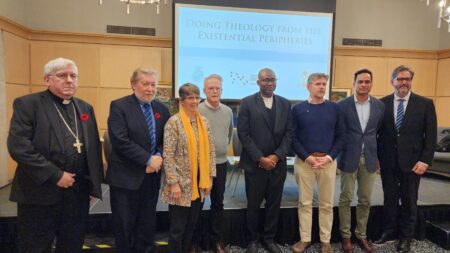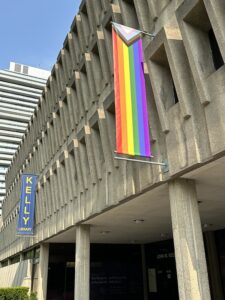Pope Francis has invited us to listen to one another in a synodal church. St. Mike’s hosted a panel discussion on the international theological project Doing Theology From The Existential Peripheries a research project of the Dicastery on Promoting Integral Human Development, Holy See. The project aims at deepening the teachings of Pope Francis and renewing theology.
Carl O’Byrne is a graduate of the University of St. Michael’s College. He has a background in education. Currently he is the coordinator of All Inclusive Ministries (AIM).
On November 10, 2022, the University of St. Michael’s College held a panel discussion on the findings of a North American report commissioned by the Vatican as part of Doing Theology from the Existential Peripheries:

Doing Theology from the Existential Peripheries is a research project of the Migrants and Refugees Section (M&R) of the Dicastery for Promoting Integral Human Development, Holy See. It aims at deepening the teaching of Pope Francis and promoting a renewal of theology. The project is built on the belief that those who have been marginalized, whether socioeconomically, socially, or in other ways, hold a wisdom capable of reopening discourse, especially where there are tensions. Specifically, it seeks to uncover the sensus fidei fidelium of those often excluded from discourse within society and especially within the Church. In this way, we can nurture and grow Christian thought beginning from a deep sense of faith in order to transform lives and hearts once again.
I have been involved in one way or another with All Inclusive Ministries (AIM) in its varied iterations since the 1980s, the height of the AIDS crisis. AIM is a Roman Catholic community of LGBTQ+ and allies aiming to provide equal access to worship, opportunities, and resources within the Church for LGBTQ+ faithful who often feel excluded or marginalized.
Being excluded or marginalized provided a fit with the project of the Migrants and Refugees Section of the Dicastery for Promoting Integral Human Development, Holy See. Sounds complicated? It is. How do you classify, categorize millions of people worldwide?
Quite unexpectedly, I came to be on the panel discussion at St Mike’s. My first thought, after an immediate and sincere prayer of supplication, i.e., omG, was not some lofty goal of inclusion, but of the late comedian of some controversy, a gay icon, Joan Rivers. In the 1980s, Joan Rivers’s catchphrase Can we talk? went viral – and going viral did not precisely have the same meaning then as it does now in the age of social media. Going viral at that time might justifiably be linked more often to the spread of HIV/AIDS. Joan Rivers did a lot of talking. She talked to, with, and about LGBTQ+ people regardless of their health status. She was an advocate – in the true sense of the word – she talked toward something; added her voice. She did so for the rest of her life.
At that time, the Church (for the greatest part) did not talk to the gay (common usage from that era) community, other than to condemn. For those of our community lucky enough to live in Toronto at that time, and still, up to the present, the Society of Jesus, the Jesuits, and their parish, Our Lady of Lourdes, was the sole, and most welcome exception. They talked to us, with us, provided pastoral support, and buried our dead at a time when few others would. We will never forget.
I have no nostalgic attachment to the 1980s. Being stuck in any particular time is never a good thing. The expression, Can we talk? cuts to the heart of the matter. It goes beyond being a catchphrase of a particular person, and era. It eliminates everything that is not essential. It holds clarity and complexity. It leads to the heart of the matter – a bonus as we enter June, the month of Pride, and also, for Catholics, the month devoted to the Sacred Heart of Jesus.
One of the very surprising things about Pope Francis’s Synod on Synodality is that it actually welcomed people to talk, to share their thoughts about the state of the Church in the very early period of the third millennium. But how practically would this unfold? Many (the majority?) LGBTQ+ people have left the Church. Their reasons for doing so are valid, and easily, empathetically understood. Not surprisingly, there was a great deal of skepticism regarding the synodal process. For example, would dioceses institutionally unfriendly, or openly hostile to LGBTQ+ people now listen? And then what? Would diocesan reports sent to the Vatican accurately reflect what conversations (if any) actually discussed?
This quandary was removed by the way the research project was conducted, and by the way it was reported to the Dicastery for Promoting Integral Human Development: directly, with no diocesan intermediary. Pope Francis also talks. For example, in his encyclical Fratelli Tutti:
I sometimes wonder why … it took so long for the Church unequivocally to condemn slavery and various forms of violence. Today, with our developed spirituality and theology, we have no excuses. Still, there are those who appear to feel encouraged or at least permitted by their faith to support varieties of narrow and violent nationalism, xenophobia and contempt, and even the mistreatment of those who are different. Faith, and the humanism it inspires, must maintain a critical sense in the face of these tendencies, and prompt an immediate response whenever they rear their head. For this reason, it is important that catechesis and preaching speak more directly and clearly about the social meaning of existence, the fraternal dimension of spirituality, our conviction of the inalienable dignity of each person, and our reasons for loving and accepting all our brothers and sisters.

Can we talk?
Yes. And we did, thanks to the University of St Michael’s College. The College not only provided the physical setting; it did so much more. It facilitated and encouraged the free and welcome exchange of ideas. Courageously. With the promise to do so in the future: Theology from the Existential Peripheries. Such gratitude is well placed but St Mike’s, like any institution, is ultimately only as good as the people who guide it. So, thank you to Drs. Michael Attridge, Darren Dias, Mark McGowan, and David Sylvester. Well done.
Please note: The Kelly Library will continue to display the Progress Pride banner until the end of September as St. Mike’s prepares to welcome the Class of 2T7 to campus this fall.
Read other InsightOut posts
